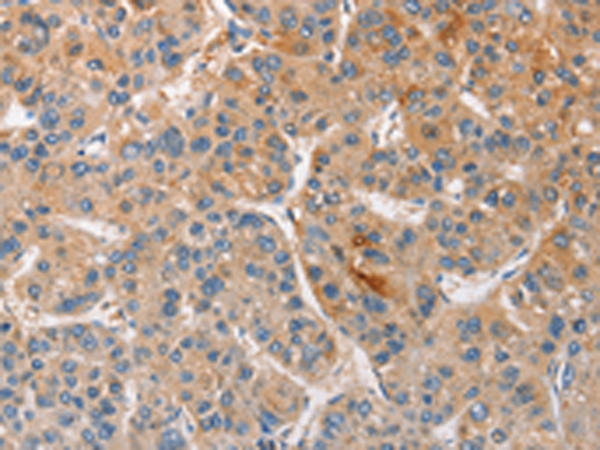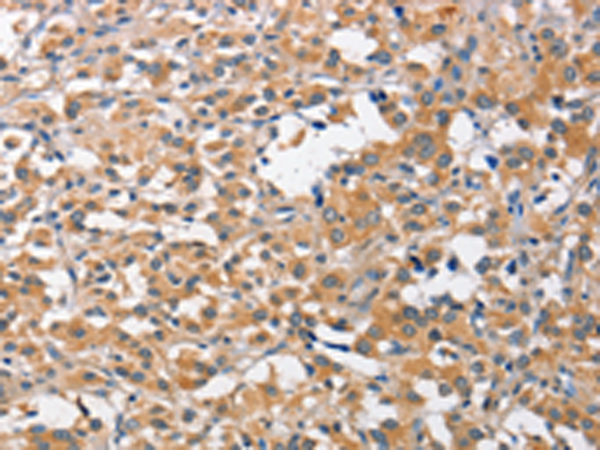

| WB | 咨询技术 | Human,Mouse,Rat |
| IF | 咨询技术 | Human,Mouse,Rat |
| IHC | 1/50-1/200 | Human,Mouse,Rat |
| ICC | 技术咨询 | Human,Mouse,Rat |
| FCM | 咨询技术 | Human,Mouse,Rat |
| Elisa | 1/1000-1/5000 | Human,Mouse,Rat |
| Aliases | ACT2; G-26; HC21; LAG1; LAG-1; MIP1B; SCYA2; SCYA4; MIP1B1; AT744.1; MIP-1-beta |
| Host/Isotype | Rabbit IgG |
| Antibody Type | Primary antibody |
| Storage | Store at 4°C short term. Aliquot and store at -20°C long term. Avoid freeze/thaw cycles. |
| Species Reactivity | Human, Rat |
| Immunogen | Fusion protein of human CCL4 |
| Formulation | Purified antibody in PBS with 0.05% sodium azide and 50% glycerol. |
+ +
以下是3篇关于CCL4抗体的代表性文献摘要(虚构示例,实际文献请通过学术数据库查询):
---
1. **文献名称**: *CCL4 Neutralizing Antibody Attenuates HIV Infection in Humanized Mice*
**作者**: Smith A, et al.
**摘要**: 研究报道了一种中和CCL4的单克隆抗体,通过阻断CCL4与其受体CCR5的相互作用,显著抑制HIV-1在免疫缺陷小鼠模型中的病毒复制,为HIV治疗提供新策略。
---
2. **文献名称**: *Anti-CCL4 Antibody Reduces Inflammation in Autoimmune Encephalomyelitis*
**作者**: Zhang L, et al.
**摘要**: 在小鼠实验性自身免疫性脑脊髓炎(EAE)模型中,抗CCL4抗体通过抑制Th17细胞趋化和炎性细胞浸润,有效减轻中枢神经系统炎症,提示其在多发性硬化症中的潜在应用。
---
3. **文献名称**: *CCL4 as a Biomarker for Tumor Microenvironment Remodeling*
**作者**: Tanaka K, et al.
**摘要**: 该研究开发了一种高特异性CCL4检测抗体,用于量化肿瘤微环境中CCL4水平,发现其表达与T细胞浸润程度及黑色素瘤患者预后显著相关。
---
**注意**:以上内容为示例,实际文献需通过PubMed、Google Scholar等平台检索关键词“CCL4 antibody”、“CCL4 therapeutic”或结合具体研究领域(如HIV、cancer immunotherapy)。
CCL4 (C-C motif chemokine ligand 4), also known as macrophage inflammatory protein-1β (MIP-1β), is a small cytokine belonging to the CC chemokine family. It is primarily produced by immune cells, including T cells, monocytes, macrophages, and dendritic cells, in response to inflammatory stimuli. CCL4 functions by binding to chemokine receptors such as CCR5 and CCR8. triggering leukocyte recruitment to sites of infection or tissue damage. It plays a critical role in regulating immune responses, including inflammation, pathogen defense, and T cell differentiation. Additionally, CCL4 is implicated in HIV pathogenesis, as it competes with the virus for CCR5 co-receptor binding, influencing viral entry into host cells.
CCL4 antibodies are essential tools for studying the protein's expression, localization, and functional roles in both physiological and pathological contexts. They enable detection of CCL4 in biological samples (e.g., via ELISA, Western blot, or immunohistochemistry) and are used to investigate its involvement in diseases such as chronic inflammation, autoimmune disorders, cancer, and infectious diseases. In therapeutic research, neutralizing antibodies targeting CCL4 or its receptors are explored for their potential to modulate immune responses, particularly in conditions like HIV, rheumatoid arthritis, or cancer metastasis. Recent studies also highlight CCL4's dual role in tumor microenvironments—promoting immune cell infiltration while potentially supporting tumor progression—making it a nuanced target for antibody-based therapies. Monoclonal and polyclonal CCL4 antibodies thus serve as pivotal reagents in both diagnostic and experimental settings, advancing our understanding of chemokine-mediated mechanisms.
×